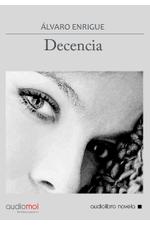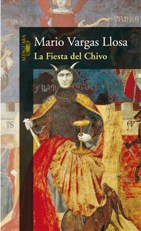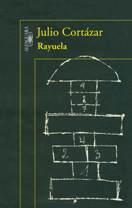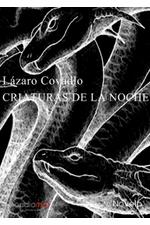Blog del Instituto Cervantes de Dublín
Torre Martello
Hispanic power / Poder hispano
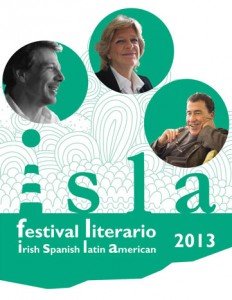 Is there anybody there on the other side of the book? How do readers and writers connect today? Faced with uncertainty, María Tena continues writing and editing, having dedicated her entire life to the world of culture, with eminent roles in this area.
Is there anybody there on the other side of the book? How do readers and writers connect today? Faced with uncertainty, María Tena continues writing and editing, having dedicated her entire life to the world of culture, with eminent roles in this area.
Álvaro Enrigue, literary critic, novelist and Professor of creative writing, hails from the United States, where Hispanic power is becoming increasingly visible. However, is it possible to “create” writers, when it seems like readers tear them apart? How much power does an editor have over the final draft? What about a critic or an agent? Does an author have any power? How powerful are the institutions that set trends?
Fernando Sánchez Dragó, essayist, novelist, anarchist and literary scholar, will also participate in the discussion of these powerful themes.
“Hispanic power” is the title of our fourth round-table discussion in our Isla Literary Festival. Moderated by Catherine Leen.
¿Hay alguien ahí, del otro lado del libro?, ¿dónde se encuentran hoy escritores y lectores? Ante la incertidumbre, María Tena continúa escribiendo y editando tras una vida entera dedicada al mundo de la cultura, con puestos de gran responsabilidad en esta área.
Desde Estados Unidos, donde el «poder hispano» se hace cada vez más visible, llega Álvaro Enrigue, crítico literario, novelista y profesor de literatura creativa. Pero, ¿acaso es posible «hacer escritores» cuando parece que los lectores se «deshacen»? ¿Cuál es el poder del editor sobre la calidad final de la obra?, ¿y de un crítico, de un agente?, ¿tiene algún poder el autor?, ¿cuál es el poder de las instituciones para marcar tendencias?
Sobre estos y otros poderosos temas tendrá también mucho que aportar Fernando Sánchez Dragó, ensayista, novelista, anarquista individualista, sabio de la literatura.
The novel: memory and resistance / La novela: memoria y resistencia
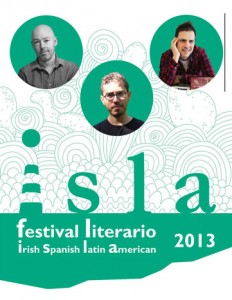 John Boyne, Julio Espinosa and Kirmen Uribe have dealt extensively with the theme of resistance against power in their novels, and they all with be with us on Saturday, 19th October, in our Isla Literary Festival.
John Boyne, Julio Espinosa and Kirmen Uribe have dealt extensively with the theme of resistance against power in their novels, and they all with be with us on Saturday, 19th October, in our Isla Literary Festival.
From the Chilean dictator whose echoes resonate in La fría piel de agosto to the bombing of Guernica that resounds in Lo que mueve el mundo, the Nazi concentration camps in The Boy in the Striped Pijamas and the Russian Czar from The House of Special Purpose, not least forgetting the mutineers from The Bounty. More information on our website!
Uno de los platos fuertes de nuestro Festival Isla será la visita de John Boyne con Julio Espinosa y Kirmen Uribe. Con ellos hablaremos de novela, de memoria y resistencia en una mesa moderada por Cara Levey.
Si toda la obra de Gabriel García Márquez es un retrato del poder, quizás la obra de Mario Vargas Llosa sea un retrato de la resistencia, o de la toma de conciencia frente a ese poder.
John Boyne, Julio Espinosa y Kirmen Uribe han abordado en sus novelas, profusamente, el tema del poder y de la resistencia frente al poder. De la dictadura chilena, cuyos ecos resuenan en La fría piel de agosto, hasta el bombardeo de Guernica que retumba en Lo que mueve el mundo, pasando por los campos de concentración nazis de El niño del pijama de rayas y la rusia zarista de La casa del propósito especial, sin olvidar a unos marineros amotinados en el Bounty.
Más información sobre el festival, cómo no, en nuestra página web.
Isla Festival was presented in Madrid last Friday / El Festival Isla de Literatura fue presentado en Madrid
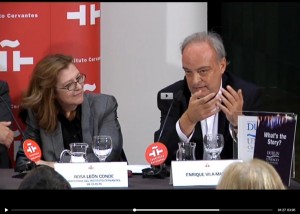 Writers John Banville and Enrique Vila- Matas presented last Friday the Isla Festival of Literature at the Instituto Cervantes in Madrid , an event that will gather in Dublin 16 writers from Spain , Ireland and Latin America .
Writers John Banville and Enrique Vila- Matas presented last Friday the Isla Festival of Literature at the Instituto Cervantes in Madrid , an event that will gather in Dublin 16 writers from Spain , Ireland and Latin America .
The second edition of this festival will be held from the 18th to the 20th October at the Instituto Cervantes in Dublin. Spanish and Latin American literature will be very well represented in Ireland along with the best Irish literature through panel discussions and readings.
As already announced in previous posts on this blog , in the Festival Isla (ISLA is the acronym for Irish Spanish and Latin American) , will participate authors from Argentina , Chile , Cuba , Mexico , Spain and Ireland.
Durin the presentation in Madrid, John Banville recalled the impression of reading in his youth One Hundred Years of Solitude by Gabriel García Márquez , and other Spanish authors , and regretted the lack of presence of Hispanic literature in Ireland. Meanwhile, Enrique Vila- Matas , author of Dublinesca (2010 ) , defined himself as a “literary traveler” who has visited Dublin compulsively (16 times in four years) .
All information about the festival is on our website.
Los escritores John Banville y Enrique Vila-Matas presentaron el pasado viernes en el Instituto Cervantes de Madrid el Festival Isla de Literatura, una cita que reunirá en Dublín a 16 escritores de España, Irlanda y Latinoamérica.
La segunda edición de este festival se celebrará, como sabéis, del 18 al 20 de octubre. A través de mesas redondas y lecturas, la literatura española e hispanoamericana estará presente en Irlanda junto a la mejor literatura irlandesa del momento.
Como ya hemos anunciado en anteriores entradas de este blog, participarán en el Festival Isla (Irish Spanish Latin American Literary Festival), autores provenientes de Argentina, Chile, Cuba, México, España e Irlanda.
En su presentación en Madrid, además de los ya mencionados John Banville y Enrique Vila-Matas, estuvieron presentes los embajadores en Irlanda de Argentina, Chile, México y, cómo no, el embajador de España en Irlanda, Javier Garrigues Flórez.
Banville recordó en su intervención la impresión que le produjo en su juventud la lectura de Cien años de soledad, de Gabriel García Márquez, y de otros autores en español, y ha lamentado la escasa presencia actual de la literatura hispana en su país. Por su parte, Enrique Vila-Matas, autor de Dublinesca (2010), se ha definido como un «viajero literario» que ha visitado «compulsivamente» Dublín (16 veces en cuatro años). Será precisamente sobre los viajes literarios de lo que hablará en ISLA dentro de unos días.
Audiobooks of the week / Audiolibros de la semana: Álvaro Enrigue
 Have you heard about Alvaro Enrigue?
Have you heard about Alvaro Enrigue?
If not, this is a very good chance to start reading and listening his books, because Álvaro Enrigue will be with us during the Isla Festival of Literature that will take place at the Instituto Cervantes from the 18th until the 20th October.
Álvaro Enrigue is one of the most celebrated young Mexican writers at the moment. He has been professor of Literature at the Ibero-American University in Mexico and of Creative Writing in Maryland. Currently, he lives in New York, where he was chosen as resident writer by the New York Public Library in 2011-2012.
During our Isla Literary Festival, he will participate in a round table discussion on Saturday and he will read a selection of his work. Are you going to miss it?
In our Audiobooks platform, you can find two novels written by him.
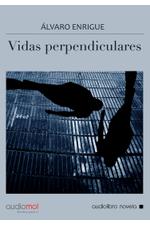
In Vidas Perpendiculares Álvaro Enrique tells us about the life of Jerónimo Rodríguez Loera. He looks apparently like a typical mexican boy, but he is able to feel his father’s fears when he is close to him, and to remember all his past lives.
If you prefer reading than listening, there is a printed version of this book available in our library.
In Decencia you can listen the story of two Mexican guerrilleros in 1973. They kidnap an important bussiness man, Longinos Brumell. When they arrive to Mexico city, a bomb explodes near the consulate of the United States in Guadalajara. This explosion will change completely the whole story.
But you still have one more option. If you prefer shot stories rather than novels, you can also download Hipotermia, a collection published for the firt time in 2004. All these posibilities are just one click away from you. Enjoy them!
¿Conoces ya la obra de Álvaro Enrigue?
Si no es así, ahora es el momento, porque Álvaro estará con nosotros en el Festival Isla de Literatura que se celebrará en el Instituto Cervantes desde el día 18 hasta el 20 de octubre.
Álvaro Enrigue, nació en 1969, es uno de los jóvenes escritores mexicanos más destacados de los últimos años y fue seleccionado por la New York Public Library como escritor residente en 2011-2012. Durante nuestro Festival Isla participará en la mesa redonda titulada «Poder Hispano». ¿Te lo vas a perder?
En la plataforma de descarga de audiolibros de nuestra biblioteca tienes a tu disposición dos novelas de este autor: Vidas perpendiculares y Decencia publicadas en 2008 y 2011 respectivamente.
Hoy, por ello, no te proponemos uno sino dos audiolibros de la semana.
 En Vidas perpendiculares, el autor Álvaro Enrigue nos cuenta la historia de Jerónimo Rodríguez, cuyos rasgos físicos son iguales a los de un típico chico mexicano. Sin embargo, al mismo tiempo, Jerónimo tiene la habilidad de sentir los miedos de su padre cuando está cerca de él, y puede recordar cuáles eran sus sentimientos cuando vivía con una tribu prehistórica o cuando vivía en el siglo XVII en Italia. El autor escribe todas estas vidas pasadas y la presente con un nexo de unión entre todas, la búsqueda del amor.
En Vidas perpendiculares, el autor Álvaro Enrigue nos cuenta la historia de Jerónimo Rodríguez, cuyos rasgos físicos son iguales a los de un típico chico mexicano. Sin embargo, al mismo tiempo, Jerónimo tiene la habilidad de sentir los miedos de su padre cuando está cerca de él, y puede recordar cuáles eran sus sentimientos cuando vivía con una tribu prehistórica o cuando vivía en el siglo XVII en Italia. El autor escribe todas estas vidas pasadas y la presente con un nexo de unión entre todas, la búsqueda del amor.
Si lo prefieres, la versión impresa de este libro también está a tu disposición en nuestra biblioteca.
En Decencia conoceremos la historia de dos guerrilleros mexicanos que secuestran en 1973 a un importante hombre de negocios, Longinos Brumell, quien los ayudará a viajar hasta ciudad de México. Cuando llegan a la capital, de repente, una bomba explota en el consulado de los Estados Unidos en Guadalajara. Esta explosión cambiará por completo el desarrollo de toda la historia.
Y aún te ofrecemos una opción más. Si lo que te gusta son los cuentos, también puedes descargarte Hipotermia, un libro de relatos publicado por primera vez en 2004
Todos ellos están a tu disposición, a un clic que distancia. ¡Que los disfrutes!
Poetry: profession or possesion? / Poesía: ¿profesión o posesión?
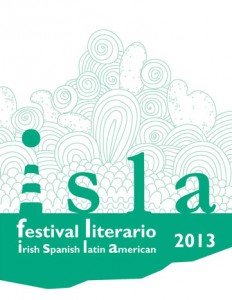 People have always questioned the nature of poetry. Does the poet who writes the poem have control over it, or is it actually the poetry that takes hold of the poet, which he uses to express himself?If the poet is indeed the protagonist, the true essence of poetry, how does it serve him and the role that he plays? What is, or what should be, his relationship with power and the public?
People have always questioned the nature of poetry. Does the poet who writes the poem have control over it, or is it actually the poetry that takes hold of the poet, which he uses to express himself?If the poet is indeed the protagonist, the true essence of poetry, how does it serve him and the role that he plays? What is, or what should be, his relationship with power and the public?
Friday, 18th October, the first round-table in our Isla Literary Festival 2013 presents three poets with very different backgrounds and influences, Miguel Barnet (Cuba), Daniel Freidemberg (Argentina), and Tomás Mac Síomóin (Ireland) will explore these themes that bring us close to Calliope´s heart. Moderated by Lorna Shaughnessy.
Desde siempre, el ser humano se ha preguntado por la naturaleza de la poesía. ¿Es el poeta quien escribe el poema, quien lo domina, o es por el contrario la poesía la que posee al poeta y lo utiliza para expresarse? Y si el poeta es el protagonista, el verdadero centro de la poesía, ¿para qué sirve él y el oficio que desempeña?, ¿cuál es o debe ser su relación con el poder y la res pública?
En la mesa que abrirá nuestro Festival Isla 2013, tres poetas de muy diferentes procedencias e influencias, Miguel Barnet (Cuba), Daniel Freidemberg (Argentina) y Tomás Mac Síomóin (Irlanda) partirán de estos temas rumbo hacia el corazón de Calíope. Moderados por Lorna Shaughnessy.
Isla Literary Festival 2013 / Festival Isla de Literatura 2013
 Instituto Cervantes Dublin is pleased to present the second edition of the Isla Festival of Literature.
Instituto Cervantes Dublin is pleased to present the second edition of the Isla Festival of Literature.
This is a unique opportunity to attend a gathering of Irish and Hispanic literature where you will enjoy round tables, readings and other parallel events during three consecutive days. This year, on the second edition of this festival we will have 16 authors from Argentina, Chile, Cuba, Ireland, Mexico and Spain. Poetry, novel, essay, theatre and cinema will be the main characters of a pluralistic program for all audiences.
The ISLA Festival or Irish, Spanish and Latin American Literary Festival is a cultural initiative in Ireland carried out by the Instituto Cervantes Dublin in collaboration with the Embassies of Argentina, Chile, Cuba, Spain and Mexico, as well as Dublin UNESCO City of Literature, Ireland Literature Exchange, Poetry Ireland and with kind support of Dublin City University, Trinity College Dublin, NUI Galway and NUI Maynooth.
Poco más de un mes para que de comienzo el Festival Isla de Literatura 2013. En este festival reuniremos a dieciséis escritores de Irlanda, España y Latinoamérica, tres días consecutivos con mesas redondas, lecturas y otros eventos paralelos. En esta edición, contaremos con 16 autores provenientes de Argentina, Chile, Cuba, Irlanda, México y España. Poesía, novela, ensayo, teatro y cine, serán los protagonistas de un programa plural y para todos los públicos.
El Festival ISLA (Irish Spanish Latin American Literary Festival) es una iniciativa cultural puesta en marcha en Irlanda por el Instituto Cervantes de Dublín con la colaboración de las Embajadas de Argentina, Chile, Cuba, España y México, Dublin UNESCO City of Literature, Ireland Literature Exchange, Poetry Ireland y el apoyo de las universidades Dublin City University, Trinity College Dublin, NUI Galway y NUI Maynooth.
The Best Novels of the 21st Century / Las mejores novelas del siglo XXI
¡Ya estamos de vuelta! Esperamos que todos hayáis disfrutado de las merecidas vacaciones veraniegas. Ahora es el momento de volver a nuestros autores, nuestros libros, nuestras películas favoritas. Seguro que con ellas no será menos penosa la vuelta a la rutina.
¿Recuerdas cuál era el tema que te propusimos para el verano? Todavía estás a tiempo de leer algunas de las mejores novelas del siglo XXI. Seguro que con ellas te resultará más llevadero el regreso a la rutina.
Ya hace trece años que inauguramos el siglo XXI y como no, paulatinamente empiezan a surgir listas que seleccionan lo más destacado de la literatura desde el comienzo del siglo.
En junio, el periódico ABC publicaba los resultados de la encuesta realizada a escritores, editores, agentes y personalidades de la cultura que elegían “La fiesta del chivo” del Premio Nobel Mario Vargas Llosa como la novela española más importante de lo que llevamos de siglo.
Desde la biblioteca coincidimos en que las obras seleccionadas tienen una indudable calidad literaria y las ponemos a tu disposición para que durante los meses de verano disfrutes de la mejor literatura española contemporánea.
- La Fiesta del Chivo. Mario Vargas Llosa. Ficción histórica ambientada en la dictadura de Trujillo supone una reflexión sobre la libertad desde el recuerdo. Está estructurada y ambientada magistralmente, colocándose entre las grandes obras de Vargas Llosa.
- Crematorio. Rafael Chirbes. Narra la vida de un empresario inmobiliario sin escrúpulos. Considerada el retrato perfecto de la crisis económica, política y moral de los últimos años.
- Tu rostro mañana. Javier Marías. Ambiciosa trilogía compuesta por ”Fiebre y lanza”,”Baile y sueño” y ”Veneno y sombra y adiós”. El autor se enfrenta a temas como la mentira, la violencia, el miedo o las metamorfosis que pueden sufrir los seres que amamos.
- Soldados de Salamina. Javier Cercas. Novela con tono de investigación periodística que obtuvo gran éxito de crítica y público. Narra un episodio poco conocido de la Guerra Civil.
- La sombra del viento. Carlos Ruiz Zafón. Éxito sin paliativos, supone el regreso de los mejores elementos del folletín. Ha vendido diez millones de ejemplares en 36 idiomas.
- Los enamoramientos. Javier Marías. Con una prosa profunda y cautivadora, la obra reflexiona sobre el estado de enamoramiento, que parece justificar tanto las acciones nobles y desinteresadas, como los mayores desmanes y ruindades.
- La piel fría. Albert Sánchez Piñol. El escritor construye un relato lleno de misterio situándose en un faro situado en el fin del mundo a través de una novedosa forma de narrar.
- El mal de Montano. Enrique Vila-Matas. El mal de Montano es aquel que afecta a un escritor enfermo de literatura. El protagonista decide entrar a formar parte de una sociedad secreta de conjurados contra los enemigos de lo literario.
- Rabos de lagartija. Juan Marsé. La realidad concreta y la ficción se mezclan en este magnífico retrato de la España de la posguerra poniendo en juego viejos temas: la tenue línea que separa el amor del desamor, el bien del mal o la verdad de la mentira.
- El día de mañana. Ignacio Martínez de Pisón. El retrato a modo de caleidoscopio de Justo Gil, emigrante llegado a Barcelona que se convertirá en confidente de la Brigada Social, es trazado a través de los que le conocieron.
We are back! We hope you all have a very nice summer! Now, it’s time to remember about our favourite authors, books, films… Do you remember which was our topic of the month for this summer? Yes, you are right! You are still on time to read some of the best novels of the 21st Century!
It’s been thirteen years since the 21st century began and of course, gradually there are new lists choosing the very best of literature during these years.
In June, ABC newspaper published the results of a survey conducted to writers, editors, agents and cultural personalities who chose “La fiesta del chivo” by Nobel Prize Mario Vargas Llosa as the most important Spanish novel of the 21st century so far.
Here at the library we also think that the selected works have an unquestionable literary quality and we put them at your disposal so you can enjoy the very best of contemporary Spanish literature during the summer.
- La Fiesta del Chivo. Mario Vargas Llosa. Historical fiction set in the dictatorship of Trujillo. It’s a reflection about freedom from the memories. Superbly set and structured, it is among the great works by Vargas Llosa.
- Crematorio. Rafael Chirbe. It narrates the life of a real-state businessman without scruples. It’s considered the perfect portrait of the economical, political and moral crisis of the last years.
- Tu rostro mañana. Javier Marías. Ambitious trilogy made up of “Fiebre y lanza”, “Baile y sueño” and “Veneno y sombra y adiós”. The author faces themes as violence, lies and the fear or the metamorphosis that can suffer the people we love.
- Soldados de Salamina. Javier Cercas. Novel with a tone of journalistic research that was a big success in terms of critics and public. It narrates an obscure episode during the Spanish Civil War.
- La sombra del viento. Carlos Ruiz Zafón. It was a huge commercial success using the best elements of serial novel. It sold 10 million copies in 36 languages.
- Los enamoramientos. Javier Marías. Using a profound and captivating prose, the novel reflects on the infatuation, a state that seems to justify noble and altruistic actions but also the biggest outrages and lowness.
- La piel fría. Albert Sánchez Piñol. The author constructs a story full of mystery through a new way of narrating. The story is located in a lighthouse at the end of the world.
- El mal de Montano. Enrique Vila-Matas. Montano’s malady affects to a writer sick of literature. The main character decides to become a member of a secret society to conspire against enemies of the literary world.
- Rabos de lagartija. Juan Marsé. Concrete reality and fiction intertwine in this magnificent portrait of Spain after the Civil War using some of his old themes: the thin line that separates love and lack of love, the good and the bad or the truth of the lie.
- El día de mañana. Ignacio Martínez de Pisón. The portrait of Justo Gil, an immigrant who arrived to Barcelona and became an informer of the Social Brigade, is drawn like a kaleidoscope by those who met him.
50 years playing Hopscotch / 50 años jugando a la Rayuela
Se cumple este año el 50 aniversario de Rayuela, una de las obras maestras de la novela latinoamericana. Celebramos esta fecha en la biblioteca nombrando al escritor argentino Julio Cortázar nuestro autor del mes.
Hijo de un diplomático argentino, Julio nació en Ixelles en 1914 y murió en París en 1984. Está considerado como uno de los autores más innovadores y originales de la literatura moderna. Fue un maestro en el relato corto, la prosa poética y la narración breve en general, a la altura de escritores como Jorge Luis Borges, Antón Chejov o Edgar Allan Poe.
Creó una serie de relatos y novelas que supusieron una nueva forma de hacer literatura en la narrativa mundial, rompiendo las pautas clásicas mediante narraciones que escapan de la linealidad temporal y donde los personajes adquieren mayor autonomía y profundidad psicológica. Con frecuencia sus personajes transitan entre lo real y lo fantástico. De hecho, el surrealismo es una de las corrientes que está presente en la mayoría de su obra.
Todos estos elementos encuentran su mayor exponente en Rayuela, una de las novelas claves del boom latinoamericano que cincuenta años más tarde sigue manteniendo la misma frescura y modernidad de su estreno.
Hopscotch (Rayuela), one of the masterpieces of Latin American novel celebrates its 50th anniversary and on this ocasion, his author, Julio Cortázar, is our author of the month in June.
He is considered one of the most innovative and original writers of modern literature. Cortázar was a master of short-stories, poetic prose and short narrative, equal to other great writers as Jorge Luis Borges, Antón Chejov or Edgar Allan Poe.
He created a number of short-stories and novels that led to a new form of making literature worldwide, breaking the classic rules through narrations that escape temporal lineup and where characters gain more autonomy psychological depth. His characters often pass through the real and the fantastic. In fact, surrealism is an element that is present in most of his work.
All these elements find its best exponent in Hopscotch, one of the key novels of Latin American boom. Fifty years later it’s still keeping the same freshness and modernity.
Audiobook of the Week | Audiolibro de la semana: Criaturas de la noche
Criaturas de la noche by Argentinian writer Lázaro Covadlo is our audiobook of the week. Don’t you know how to use our audiobooks service yet? Well, it’s as simple as taking your library card and click on the link.
“A modern fable, wonderfully written and also original”. That’s how the jury of the Café Gijón Award defined this novel about a clumsy and failed man who has a very special flea living inside his ear. This flea dictates convincing speeches to impose its evil willpower in exchange for rescuing him from his misery and lack of affection. With this novel Covadlo steadies himself as one of the most fascinating writers of contemporary writers.
Criaturas de la noche del escritor argentino Lázaro Covadlo es nuestro audiolibro de la semana. ¿Todavía no sabes como usar nuestro servicio de audiolibros? Pues es muy simple, coges tu carnet de la biblioteca y pulsas en el enlace.
“Una fábula moderna, extraordinariamente escrita y además original.” Así definió el jurado del premio Café Gijón esta novela, que trata de un hombre patoso y fracasado, a quien una pulga muy particular que se ha instalado en su oído, dicta discursos convincentes con los que pretende imponer su voluntad diabólica a cambio de rescatarlo de la miseria y el desamor. Con esta novela, Covadlo afianza una de las trayectorias más fascinantes de la literatura contemporánea.
Audiobook of the Week | Audiolibro de la semana: Santo remedio
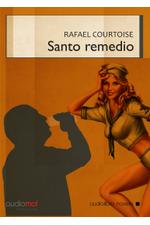 The audiobook of the week is Santo remedio by Rafael Courtoise. You just need your library card, click here and done! Just enjoy this story that won’t leave you indifferent.
The audiobook of the week is Santo remedio by Rafael Courtoise. You just need your library card, click here and done! Just enjoy this story that won’t leave you indifferent.
Euthanasia is used in this novel as a metaphor of an unhinged century. It is a lucid look to American reality. There is no restraint, no poetry, no calm. This novel is brutal and beautiful humanity. Vertigo, a spiritual and material journey. The best suspense, wild humour and tenderness in lethal doses.
Euthanasia, medical power, and the bussiness of traditional and alternative therapies circle and hound Pablo Green, victim and criminal, a young man who gabbles and insults in a bizarre English and suffers in simple Spanish, gets sick with fast food and climbs the hills of desperation after choosing his mother’s death. Crime and existential novel, implacable narrative machine, this story is made of human flesh and bumpy rides. Written with accuracy and subtle irony, each word is a hit in your conscience. Not a moment of tranquility: just beauty.
El audiolibro de la semana es Santo remedio de Rafael Courtoise. Solo necesitas tu carnet de la biblioteca, pulsar aquí y ¡hecho!, ya puedes disfrutar de esta historia que no te dejará indiferente.
La eutanasia como metáfora de un siglo desquiciado. Una mirada lúcida hacia la realidad americana. Ni un instante de mesura, ni una gota de poesía, ni una línea de quietud. Esta novela es humanidad brutal y hermosa. Vértigo, viaje material y espiritual. Suspenso del mejor, humor salvaje, ternura en dosis letales.
La eutanasia, el poder médico, el negocio de las terapias tradicionales y alternativas rondan y acosan a Pablo Green, víctima y victimario, joven que farfulla e insulta en un inglés bizarro y sufre en español liso y llano, se indigesta con fast food y trepa por las cimas de la desesperación luego de decidir la muerte de su madre. Novela policial y existencial, implacable maquinaria narrativa, este relato está hecho de carne humana y sobresaltos. Escrita con precisión y sutil ironía, cada palabra es un golpe de conciencia. Ni un segundo de tranquilidad: sólo belleza.
Audiolibro de la semana | Audiobook of the Week: Bajo este sol tremendo
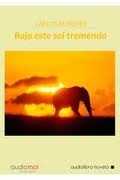 El audiolibro de esta semana es Bajo este sol tremendo del escritor argentino Carlos Busqued. Si deseas descargar este audiolibro solamente necesitas el carnet de la biblioteca y pulsar en este enlace.
El audiolibro de esta semana es Bajo este sol tremendo del escritor argentino Carlos Busqued. Si deseas descargar este audiolibro solamente necesitas el carnet de la biblioteca y pulsar en este enlace.
Cetarti está hundido en la nada. Sin trabajo ni propósito, pasa sus días encerrado viendo la televisión y fumando porros hasta que un desconocido le informa de que su madre y su hermano han sido asesinados a escopetazos. Viaja a Lapachito, el derruido pueblo donde vivía su madre, para hacerse cargo de los cadáveres. Allí, conoce a Duarte, antiguo militar, albacea y amigo del asesino de su madre, y a Danielito. Es una novela poderosa, construida desde el relato de las acciones de estos outsiders casi absolutos, sin discursos éticos o políticos sobre la tortura, el crimen, la culpa, el vacío existencial o la historia reciente del país. Y, sin embargo, estos temas asoman en la trama, golpeando la narración como chocan los insectos contra el parabrisas de los coches que conducen Cetarti, Duarte y Danielito en sus viajes a la nada.
The audiobook of the week is Bajo este sol tremendo by Argentinian writer Carlos Busqued. If you wish to download this audiobook you only need to get your library card and click here.
Cetarti is completely down. Without a job or any purpose in life, he spends his days locked watching tv and smoking joints until a stranger informs him that his mother and his brother have been shot and assassinated. He travels to Lapachito, a village in ruins where his mother used to live to take charge of the bodies. There he meets Danielito and Duarte, a former military man, executor and friend of his mother’s murderer.
This is a powerful novel, constructed with the actions of these outsiders without any ethical or political lesson about torture, crime, guilt, existential emptiness or the recent history of the country. Nevertheless, these issues are present in the narration as the insects that crash into the windscreen of the cars driven by Cetarti, Duarte and Danielito in their trips to nothingness.
Audiolibro de la semana | Audiobook of the Week: El anticlub
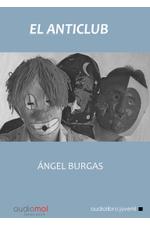 Esta semana te traemos el audiolibro El anticlub de Àngel Burgas. Es una historia protagonizada por niños pero que se puede disfrutar a todas las edades. La descarga de este audiolibro solo requiere que busques tu carnet de biblioteca y pulses aquí.
Esta semana te traemos el audiolibro El anticlub de Àngel Burgas. Es una historia protagonizada por niños pero que se puede disfrutar a todas las edades. La descarga de este audiolibro solo requiere que busques tu carnet de biblioteca y pulses aquí.
Un grupo de nueve compañeros de clase se unen para formar un club. No son perfectos, en realidad nadie lo es. Su intención es luchar contra las injusticias en un intento valiente de hacer un mundo más justo como reflejo del que quieren encontrar cuando sean mayores. Las “acciones anti” que protagonizan, los unen más que ninguna otra cosa desde sexto de primaria a tercero de ESO.
Àngel Burgas combina su trabajo como profesor de Educación visual y plástica con su carrera literaria, en la que ha escrito tanto narrativa para adultos como literatura infantil y juvenil. Burgas ha ganado premios como el Mercè Rodoreda, el Joaquim Ruyra o el de La Galera Jóvenes Lectores.
This week we bring you the audiobook El anticlub by Àngel Burgas. In this story children are the protagonists but it can be enjoyed by people of all ages. The downloading of this audiobook only requires your library card and click here.
A group of nine classmates join to make a club. They are not perfect, actually nobody is. Its purpose is to fight injustice in a brave try to make a better world, the world they want to have when they grow up. Their “anti actions” bring them together more that anything for several years.
Àngel Burgas combines his work as a teacher of Visual Education and Fine Arts and his literary career, he has written narrative for adults and also for children and teenagers. Burgas has won several awards: the Mercè Rododera Award, the Joaquim Ruyra Award or the La Galera Jóvenes Lectores Award.
Audiolibro de la semana | Audiobook of the Week: La enfermedad
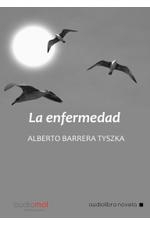 Nuestra recomendación de la semana es la novela La enfermedad del escritor venezolano Alberto Barrera Tyszka. Este audiolibro puedes disfrutarlo de muchas maneras: en casa, paseando por el parque , de camino al trabajo en el coche o el autobús… Y su descarga es tan simple como tener el carnet de la biblioteca y pulsar aquí.
Nuestra recomendación de la semana es la novela La enfermedad del escritor venezolano Alberto Barrera Tyszka. Este audiolibro puedes disfrutarlo de muchas maneras: en casa, paseando por el parque , de camino al trabajo en el coche o el autobús… Y su descarga es tan simple como tener el carnet de la biblioteca y pulsar aquí.
Ernesto Durán sabe que está enfermo. Aunque los resultados clínicos digan lo contrario, desde que se ha separado de su mujer y vive solo, padece todos los síntomas de un mal que, según sospecha, puede ser mortal. Su obsesión va más allá de la mera hipocondría, y tiene la certeza de que sólo hay un médico que puede salvarlo. Pero el elegido, el doctor Javier Miranda, en esos mismos momentos se enfrenta a una tragedia personal: un diagnóstico irrefutable que señala que su padre tiene cáncer, y le quedan pocas semanas por vivir.
La vivencia de la enfermedad en estas dos personas que ocupan posiciones tan distintas, el médico que sabe acerca de la vida y de la muerte y no quiere o no puede hablar, y el enfermo de angustia que sólo sabe que su sufrimiento no le deja vivir, es la columna vertebral que sostiene a esta hermosa novela, madura, adulta, reflexiva y refinada, que nos susurra desde su primera página algo que está en nuestra naturaleza: vivir mata.
Desde distintas historias, conmovedoras, tiernas, divertidas y trágicas, Alberto Barrera Tyszka nos propone una versión de la existencia que asume todos sus goces, pero también su fragilidad.
Our recommendation of the week is the novel La enfermedad by the Venezuelan writer Alberto Barrera Tyszka. You can enjoy this audiobook in a lot of ways: at home, walking in the park, while you go to work by car or by bus…And it’s very simple to download: you just have to take your library card and press here.
Ernesto Durán knows that he’s sick. Even though his clinical results say the opposite, since he separated from his wife he lives alone and he suffers all the symptoms of an illness that he thinks it might be fatal.
His obsession goes beyond hypochondria and he has the certainty that only a doctor can save him. But the person chosen, Doctor Javier Miranda is facing a personal tragedy at the same time: his father has cancer and the diagnosis is irrefutable. He has only a few weeks to live.
The experience of illness of these two people who are in such different situations is the spine of this beautiful, mature, reflective, and refined novel. The doctor knows about life and death but can’t talk or doesn’t know how to talk and the hypochondriac only knows that his suffering doesn’t let him live. From the very first page and through touching, tender, funny and tragic stories, the novel whispers something that it’s just in our nature: living is the way of dying.
Audiolibro de la semana | Audiobook of the Week: Tres ataúdes blancos
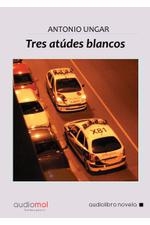 Tres ataúdes blancos del escritor colombiano Antonio Ungar es un thriller en el que un tipo solitario y antisocial es forzado a suplantar la identidad del líder del partido político de oposición y a vivir todo tipo de aventuras para acabar con el régimen totalitario de un país latinoamericano llamado Miranda. Para la descarga de este audiolibro solo necesitas tu carnet de biblioteca y pulsar aquí.
Tres ataúdes blancos del escritor colombiano Antonio Ungar es un thriller en el que un tipo solitario y antisocial es forzado a suplantar la identidad del líder del partido político de oposición y a vivir todo tipo de aventuras para acabar con el régimen totalitario de un país latinoamericano llamado Miranda. Para la descarga de este audiolibro solo necesitas tu carnet de biblioteca y pulsar aquí.
Desaforado, desquiciado, hilarante, el narrador usa todas sus palabras para cuestionar, ridiculizar y destruir la realidad (y para reconstruirla de nuevo, desde cero, como nueva).
Tres ataúdes blancos es un texto abierto, polifónico, dispuesto para múltiples lecturas. Puede ser entendido como una sátira feroz de la política en América Latina, como una refinada reflexión acerca de la identidad individual y la suplantación, como una exploración de los límites de la amistad, como un ensayo sobre la fragilidad de lo real, como una historia de amor imposible. Envuelta en un envase de thriller fácil de abrir y de leer, llena de humor, esta novela propone sin duda un juego literario complejo y fascinante. La novela que consagra indiscutiblemente a uno de los autores mayores de su generación en lengua española.
Tres ataúdes blancos is a thriller by Colombian writer Antonio Ungar in which a lonely and antisocial man is forced to impersonate the leader of the opposition political party and live all kind of adventures to finish with the totalitarian regime of a Latin American party named Miranda. If you wish to dowload this audiobook, just take your library card and click on the link.
Frenzied, unhinged, hilarious, the narrator uses all the words to question, mock and destroy reality (and to rebuild it again, starting from zero).
Tres ataúdes blancos is a polyphonic text, open to multiple lectures. It can be seen as savage criticism about the political situation ofLatin America, as a refined reflection about individual identity and impersonation, as an exploration of the limits of friendship, as an essay about the fragility of reality, as a story of impossible love. Wrapped as an easy thriller and full of humour this novel is actually a complex and fascinating literary game. This is the novel that undoubtedly establishes the author as one of the most important of his generation.
Audiolibro de la semana | Audiobook of the Week: Matías y los imposibles
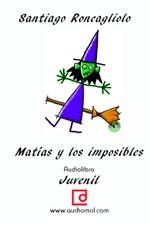 Dedicamos el audiolibro de la semana a nuestro público más joven con Matías y los imposibles del escritor peruano Santiago Roncagliolo. Si quieres conocer a sus entrañables personajes no hay más que coger tu carnet de la biblioteca y hacer click aquí.
Dedicamos el audiolibro de la semana a nuestro público más joven con Matías y los imposibles del escritor peruano Santiago Roncagliolo. Si quieres conocer a sus entrañables personajes no hay más que coger tu carnet de la biblioteca y hacer click aquí.
Matías es feíto, tímido y no tiene padres. Pero la cosa empeora cuando muere su abuelo. Entonces se queda más solo que una lechuga en un gallinero. Afortunadamente, unos inesperados amigos vendrán en su ayuda: el príncipe Guillermo, el hada Luz y el brujo Gorgon, los personajes del cuento que su abuelo le contaba y que, tras su desaparición, se han quedado sin trabajo.
Estos no entienden muy bien el mundo de las cosas reales, pero se harán amigos de Matías para vivir disparatadas aventuras traspasando la tenue frontera entre la realidad y la fantasía.
The audiobook of the week is dedicated to our young audience. It´s Matías y los imposibles by Peruvian writer Santiago Roncagliolo. If you want to meet its endearing characters, just take your library card and click here.
Matías is an ugly duckling, shy and has no parents. But things get worse when his grandfather dies. Afterwards he is left all alone. Luckily, some unexpected friends will come to help him: Prince Guillermo, Fairy Luz and Wizard Gorgon, the characters of the tale that his grandfather used to tell him and who after his decease are currently unemployed.
They don´t understand very well the world of real things, but they will become Matias´friends to live crazy adventures going through the subtle frontier between reality and fantasy.
